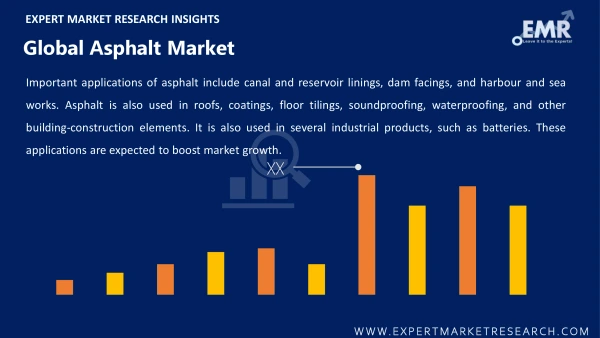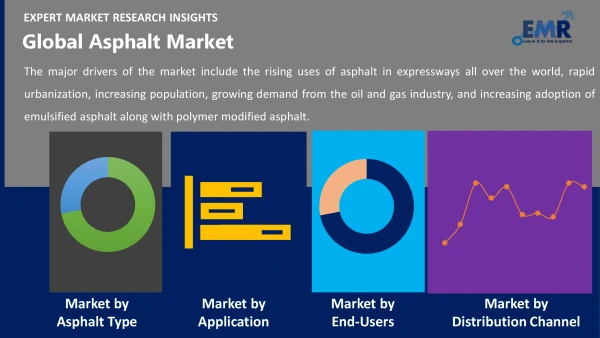
Consumer Insights
Uncover trends and behaviors shaping consumer choices today
Procurement Insights
Optimize your sourcing strategy with key market data
Industry Stats
Stay ahead with the latest trends and market analysis.
Trending Now



The global asphalt market is expected to grow at a CAGR of 5.3% during the period 2025-2034. The market is expected to be driven by the use of asphalt in expressways all over the world owing to its advantages, including quick construction, easy maintenance, driving comfort and safety, low noise levels, and others.
Base Year
Historical Year
Forecast Year







Read more about this report - REQUEST FREE SAMPLE COPY IN PDF
Asphalt, also known as bitumen, is a sticky, black, and highly viscous liquid or semi-solid form of petroleum. It is a naturally occurring substance found in deposits alongside sand, gravel, and other materials. Asphalt is primarily used in road construction as a binder mixed with aggregate particles (such as gravel, sand, or crushed stone) to create asphalt concrete, commonly used for paving roads, parking lots, and driveways. It is also used for waterproofing, sealing roofs, and in various industrial applications.
The growth of the asphalt market is aided by the crucial role of the material in infrastructure development, particularly in road construction. The consistent demand for asphalt is fuelled by the ongoing need for building and maintaining roads, highways, bridges, and airport runways, with a major portion of bitumen (a key component of asphalt) being used in road construction.
The World Bank reports that global spending on road construction and maintenance reaches USD 1.4 trillion each year. A significant portion of this investment is allocated to asphalt, favoured for its adaptability, ease of application, and durability. Among the largest infrastructure endeavours worldwide is the Bharatmala Pariyojana initiative by the Indian government, which aims to construct 34,800 kilometers of highways and roads by the year 2025. Asphalt serves as the primary material for this initiative, with the Ministry of Road Transport and Highways indicating that more than 1.5 million tons of asphalt are utilized annually for highway development under this program, thereby aiding the asphalt market growth.
Advancing sustainability in asphalt production
One of the major trend of asphalt market is that environmental concerns have heightened the focus on sustainability in the market, promoting the use of reclaimed asphalt pavement (RAP), which reduces quarrying and lowers production's carbon footprint.
Each year, more than 80 million tons of asphalt pavement are reclaimed and recycled in the United States, establishing asphalt as the most recycled material nationwide, according to the National Asphalt Pavement Association (NAPA). This recycling initiative conserves approximately 50 million tons of aggregate each year. Moreover, The trend in Europe is equally strong, with Germany recycling around 84% of its asphalt, while other European countries show recycling rates between 60% and 80%, according to the European Asphalt Pavement Association (EAPA).
Innovations in Warm Mix Asphalt Technology
Warm Mix Asphalt (WMA) technology enables the production and application of asphalt at lower temperatures, cutting energy use and emissions, and improving safety by reducing harmful fumes, which boosts the asphalt demand growth.
The Federal Highway Administration (FHWA) reports that Warm Mix Asphalt (WMA) can reduce energy consumption by 20-30% compared to Hot Mix Asphalt (HMA), making it a cost-effective and environmentally friendly choice. A report from the Texas Department of Transportation (TxDOT) stated that Warm Mix Asphalt (WMA) technology achieved fuel savings exceeding 1.2 million gallons in 2021 across various projects, highlighting its effectiveness in reducing energy consumption.
June 23, 2020
BASF's innovative bitumen additive, B2Last ®, extended road lifespan by up to 50%. Developed with the Institute of Highway Engineering in Aachen, it enhances road durability and sustainability.
October 2019
Asphalt Materials, Inc., a prominent player in the asphalt sector, acquired Wisconsin-based asphalt firms HG Meigs and Meigs Transport, enhancing its presence and operations in the Midwest.
Rising use of polymer modified asphalts
Polymer modified asphalts (PMA) are gaining traction for their superior durability and performance in extreme weather, essential in regions with significant temperature fluctuations.
In Canada, where severe winter weather is common, provinces like Ontario and Quebec have adopted Polymer Modified Asphalt (PMA) for their road construction projects which can boost the growth of the asphalt industry. Transport Canada reports that using PMA can extend pavement lifespan by up to 50% in areas that undergo freeze-thaw cycles, leading to a reduction in both the frequency and costs of repairs. In the Middle East, where high temperatures pose significant challenges for standard asphalt, Saudi Arabia has implemented Polymer Modified Asphalt (PMA) in its main road networks to tackle problems of rutting and asphalt softening due to extreme heat. A report from Saudi Aramco indicates that PMA can reduce pavement deformation by up to 60% compared to conventional asphalt, making it a crucial material for arid areas.
Global surge in infrastructure development
Global infrastructure projects are surging, especially in developing nations, driven by urbanisation and the demand for better roads, increasing asphalt use for construction and maintenance.
The United Nations forecasts that by 2050, around 68% of the global population will live in urban areas, mainly in Asia and Africa. This urban growth encourages the construction of roads and highways to support economic development, leading to a substantial rise in the demand of asphalt market for building and maintaining transportation infrastructure.
In 2022, India launched its National Infrastructure Pipeline (NIP), which includes over 7,400 projects, with a strong focus on road development. More than 60% of the budget is dedicated to transportation initiatives, particularly road construction, thereby increasing the demand for asphalt. At the same time, African countries are rapidly improving their road networks. A major example is the Trans-African Highway Network, aimed at connecting major cities across the continent and spanning more than 57,300 kilometres. Nations like Kenya, Nigeria, and Ethiopia are investing heavily in road infrastructure, resulting in a significant rise in asphalt demand.
The asphalt market growth faces several challenges that hinder its growth. Since asphalt is a byproduct of the refining of crude oil, one important issue is the volatility of crude oil prices. Manufacturers find it challenging to maintain stable production costs due to fluctuating oil prices, which has an impact on pricing stability and profit margins.
Another major obstacle is environmental concerns. The production and usage of asphalt releases harmful pollutants into the atmosphere that worsen air pollution and accelerate climate change. Governments all around the world are placing more and more limitations on the environment, putting pressure on asphalt producers to switch to environmentally friendly alternatives, which can involve more costly and advanced technological changes.
Favourable funding environments, infrastructure repair projects, and advancements in non-building construction activities all play a crucial role in driving asphalt demand. Additionally, with the growing awareness regarding the importance of maintaining and repairing existing roads and pavements, asphalt is preferred as an ideal material for its durability and cost-effectiveness in resurfacing and repairs.
Governments worldwide are investing significantly in highway repairs, road construction, and rehabilitation projects, further driving the asphalt market development. This trend is expected to continue as infrastructure remains a key focus for economic development and urbanisation globally.

Read more about this report - REQUEST FREE SAMPLE COPY IN PDF
“Global Asphalt Market Report and Forecast 2025-2034” offers a detailed analysis of the market based on the following segments:
Market Breakup by Product
Market Breakup by Asphalt Type
Market Breakup by Application
Market Breakup by End User
Market Breakup by Region
Hot Mix Asphalt is expected to account for a major market share
Hot Mix Asphalt (HMA) is the traditional form of asphalt, produced by heating aggregates and bitumen to temperatures between 150°C and 180°C before mixing. This material is widely used in high-traffic roads and areas that require outstanding durability and strength. Due to its strong properties, HMA holds a major market share and is an optimal choice for high-traffic roads, highways, and airports. According to the National Asphalt Pavement Association (NAPA), HMA made up over 85% of asphalt production in the United States in 2022.
As per the asphalt market dynamics and trends, Warm Mix Asphalt (WMA) is produced at temperatures typically 30-40°C lower than those for Hot Mix Asphalt (HMA), using either additives or water-based foaming methods. This approach results in a 20-30% decrease in energy consumption compared to HMA, which in turn reduces CO2 emissions and fuel usage. According to a study by the Federal Highway Administration (FHWA), the adoption of WMA in the United States has prevented the release of 780,000 tons of CO2 annually since 2020, thanks to its lower production temperatures.
Roadways are expected to lead the asphalt market development in the forecast period
Roadways lead the market, driven by construction market expansion. Urbanisation and population growth bolster this segment, with asphalt serving as a binding agent for roads and highways, enhancing their durability. Improved regional connectivity strengthens this segment's dominance. Asphalt also acts as a waterproofing agent, protecting roads and infrastructure, and ensuring safety and resilience against harsh weather.
According to The International Road Federation (IRF), over USD 4 trillion was spent globally on road construction and maintenance in 2022, with a significant portion of this spending allocated to asphalt, which boosts the asphalt market revenue. Due to their extensive infrastructure projects, nations like China, India, and the United States are significant contributors to the rise in asphalt consumption. 34,800 kilometers of new roads are to be built by 2025 as part of India's Bharatmala Pariyojana road network expansion plan. Since asphalt can survive a wide range of weather conditions across the nation, it is the principal material used in these projects.
Meanwhile, rapid urbanization, population growth, and high population growth are all predicted to fuel the recreation sector's expansion during the forecast period. Recreation segment will likely grow a CAGR of 5.6% during the forecast period. The NYC Parks Department set aside USD 700 million in 2022 to upgrade parks and recreational spaces across the city, emphasizing the value of utilizing environmentally friendly materials for bike lanes and walkways, such as asphalt. Furthermore, according to the United States Tennis Association (USTA), asphalt makes up more than 80% of tennis court surfaces in the country and offers a great mix between performance and affordability.
The market is expected to expand owing to the increasing infrastructure development plans implemented by governments around the world.
Among the different end-use, non-residential applications are expected to grow at a CAGR of 5.5% between 2025 and 2034 in the global asphalt market share. In non-residential settings, asphalt is used for parking lots, roads, and highways. Parking lots made of asphalt are preferred for their ability to withstand heavy traffic and harsh weather conditions. With governments around the world increasingly investing to develop roadways and pavements, the segment is likely to experience extensive growth during the forecast period and boost the asphalt industry revenue.
The residential sector also holds a substantial position as asphalt is commonly used for driveways, walkways, and private roads. Asphalt driveways are popular due to their durability, cost-effectiveness, and ease of maintenance. It is also used for recreational areas like basketball courts and playgrounds in residential communities.
According to a survey by the American Institute of Architects (AIA), the strong demand for asphalt in commercial projects drove a 4.5% growth in non-residential building in the United States in 2022. As part of the High-Tech Strategy 2025, the German government has made investments in the development of new industrial zones and commercial hubs with the goal of fostering corporate expansion and innovation. The need for asphalt has significantly increased as a result of this program, especially for major commercial hubs in cities like Munich and Berlin.
Asia Pacific Asphalt Market Trends
The Asia Pacific region is the largest market, driven by the expanding construction industry. The region is expected to grow at a CAGR of 6% between 2025-2034. This growth is primarily fuelled by the high demand for asphalt from developing economies such as South Korea, China, and India. China, in particular, stands out as a key consumer of asphalt due to its rapidly growing population and urbanisation trends. China and India are expected to grow at a CAGR of 5.7% and 6.9% during the forecast period.
As per the asphalt market analysis, China is making substantial investments in infrastructure initiatives via the Belt and Road Initiative (BRI), with an objective to construct 30,000 kilometres of roads by the year 2030. Asphalt plays a vital role in these developments due to its resilience and economic advantages. Meanwhile, India's Bharatmala Pariyojana project is set to create 34,800 kilometres of roads by 2025, which will considerably increase the demand for asphalt. The National Highways Authority of India (NHAI) is progressively adopting Polymer Modified Asphalt (PMA) in road construction to improve durability under severe weather conditions.
North America Asphalt Market Analysis
The asphalt market in North America is also expected to gain significant growth in the coming years due to government initiatives focused on upgrading ageing infrastructure, improving climate resilience, and supporting urban development. United States is expected to grow at a CAGR of 4.9% between 2025 and 2034. The Bipartisan Infrastructure Law passed in the United States in 2021, allocated USD 110 billion specifically for the improvement of roads, bridges, and other major infrastructure projects. This initiative has resulted in a substantial rise in asphalt demand, particularly for highway and urban road construction. Furthermore, there is an increasing focus on using Warm Mix Asphalt (WMA) to reduce emissions during production. According to the Federal Highway Administration (FHWA), WMA now accounts for nearly 40% of the market in the United States, leading to a 20-30% reduction in energy consumption.
Europe Asphalt Market Trends
Europe's asphalt market is expanding as a result of numerous major factors. The region's high emphasis on infrastructure development and upkeep is a key driver. The demand for asphalt is increased by the significant investments made by governments throughout Europe in road construction, maintenance, and modernization projects. The significance of enhancing transportation networks, such as roads, highways, and airports, is further emphasized by the European Union's "Green Deal" and infrastructure investment efforts. Further, the United Kingdom and France will likely grow at a CAGR of 4.7% and 4.3% during the forecast period.
Latin America Asphalt Market Opportunities
Latin America's asphalt industry is expected to grow at a CAGR of 5.5% in the forecast period. The market in LATAM is expanding as a result of rising expenditures for infrastructure development, especially for building and maintaining roads. In order to promote economic growth and strengthen regional connectivity, many Latin American nations are placing a high priority on the development and upgrading of their transportation infrastructure. The demand for asphalt is being driven by an increase in infrastructure projects, such as those involving roads, airports, and urban road networks.
In addition, the region is gradually adopting recycled asphalt and environmentally friendly substitutes, which is in line with worldwide trends toward sustainability and is anticipated to have a favorable effect on the asphalt market in Latin America.
Major asphalt market players are rapidly expanding their presence in emerging markets to solidify their position. Major players in the market are continuously expanding their production capacities and geographical presence to cater to the growing demand for asphalt, especially in emerging markets with high infrastructure development needs. Continuous research and development efforts are leading to the development of innovative asphalt products, such as warm mix asphalt (WMA) and recycled asphalt pavement (RAP), which offer improved performance and sustainability.
Aggregate Industries Ltd.
Aggregate Industries Ltd. is a leading construction materials company based in the United Kingdom, specialising in the production and supply of aggregates, asphalt, cement, concrete, and precast products. Founded in 1858, the operates numerous quarries, asphalt plants, and concrete plants across the UK, serving a wide range of customers in the construction industry.
Anglo American Plc
Anglo American Plc is a multinational mining company in the asphalt industry, founded in 1917 and headquartered in the United Kingdom. It is one of the world's largest producers of platinum, diamonds, copper, nickel, iron ore, and coal. The company has operations in Africa, Europe, Asia, Australia, and the Americas, with a strong focus on sustainable mining practices and community development.
Atlas Roofing Corporation
Atlas Roofing Corporation is a leading manufacturer of residential and commercial building materials, primarily known for its roofing and insulation products. Based in the United States and established in 1982, the company offers a wide range of roofing shingles, underlayment, and insulation solutions, serving customers across North America.
BP Plc
BP Plc, formerly British Petroleum, is a global energy company headquartered in London, UK. It was founded in 1909 and has become one of the largest oil and gas companies in the world, with operations spanning exploration, production, refining, distribution, and marketing of oil, gas, and renewable energy sources. BP is also involved in petrochemicals, trading, and renewable energy development.
Other key players in the global asphalt market are Cemex, Chevron Corporation, and Exxon Mobil Corporation, among others.
Startups in the company are focusing on several key areas to drive innovation and address the evolving needs of the sector, particularly regarding sustainability, efficiency, and cost-effectiveness. For instance, these startups are developing bioasphalt made from renewable resources like plant-based materials, which helps reduce dependence on petroleum-based products.
CarbonCure Technologies
The company’s primary focus lies in reducing carbon emissions in concrete production but its technologies can be applied to asphalt as well which can fuel asphalt market value. Its innovations in carbon sequestration align with the growing demand for sustainable asphalt production, particularly in reducing the environmental impact of road construction.
Bioasphalt
This startup focuses on developing bio-based alternatives to asphalt. Bioasphalt uses renewable resources such as plant-derived materials to create environmentally friendly substitutes for traditional petroleum-based asphalt, meeting the growing global demand for sustainable infrastructure solutions.
March 2021
Huron Capital Partners LLC acquired ACE Asphalt of Arizona, Inc. and planned to merge the company with Sunland Asphalt & Construction, Inc., a leading asphalt producer and paving solutions. The merger was aimed at providing companies with the opportunity to diversify markets and expand services to public and private customers, which can consequently have a positive impact on asphalt demand forecast.
February 2021
Cemex UK introduced Viabase , an engineered asphalt concrete designed for residential housing estate roads. The product is ideal for enduring construction traffic before final surfacing after house construction.
*While we strive to always give you current and accurate information, the numbers depicted on the website are indicative and may differ from the actual numbers in the main report. At Expert Market Research, we aim to bring you the latest insights and trends in the market. Using our analyses and forecasts, stakeholders can understand the market dynamics, navigate challenges, and capitalize on opportunities to make data-driven strategic decisions.*
Get in touch with us for a customized solution tailored to your unique requirements and save upto 35%!
The global asphalt market is projected to grow at a CAGR of 5.3% between 2025 and 2034.
The major drivers of the market include the rising uses of asphalt in roadways and pavements and the increasing adoption of emulsified asphalt along with polymer-modified asphalt.
Increasing construction activities and growing emphasis on infrastructure development are the key trends propelling the market growth.
The major regions in the market are North America, Latin America, the Middle East and Africa, Europe, and the Asia Pacific.
The various products in the market are asphalt paving mixtures and blocks, prepared asphalt and tar roofing and siding products, and roofing asphalts and pitches, coatings and cement.
The different asphalt types are hot mix asphalt, warm mix asphalt, and cold mix asphalt.
The significant applications of asphalt include roadways, waterproofing, and recreation, among others.
The key players in the market are Aggregate Industries Ltd., Anglo American Plc, Atlas Roofing Corporation, BP Plc, Cemex, Chevron Corporation, and Exxon Mobil Corporation, among others.
Explore our key highlights of the report and gain a concise overview of key findings, trends, and actionable insights that will empower your strategic decisions.
| REPORT FEATURES | DETAILS |
| Base Year | 2024 |
| Historical Period | 2018-2024 |
| Forecast Period | 2025-2034 |
| Scope of the Report |
Historical and Forecast Trends, Industry Drivers and Constraints, Historical and Forecast Market Analysis by Segment:
|
| Breakup by Product |
|
| Breakup by Asphalt Type |
|
| Breakup by Application |
|
| Breakup by End User |
|
| Breakup by Region |
|
| Market Dynamics |
|
| Trade Data Analysis |
|
| Price Analysis |
|
| Competitive Landscape |
|
| Companies Covered |
|
| Report Price and Purchase Option | Explore our purchase options that are best suited to your resources and industry needs. |
| Delivery Format | Delivered as an attached PDF and Excel through email, with an option of receiving an editable PPT, according to the purchase option. |
Datasheet
One User
USD 2,499
USD 2,249
tax inclusive*
Single User License
One User
USD 3,999
USD 3,599
tax inclusive*
Five User License
Five User
USD 4,999
USD 4,249
tax inclusive*
Corporate License
Unlimited Users
USD 5,999
USD 5,099
tax inclusive*
*Please note that the prices mentioned below are starting prices for each bundle type. Kindly contact our team for further details.*
Flash Bundle
Small Business Bundle
Growth Bundle
Enterprise Bundle
*Please note that the prices mentioned below are starting prices for each bundle type. Kindly contact our team for further details.*
Flash Bundle
Number of Reports: 3
20%
tax inclusive*
Small Business Bundle
Number of Reports: 5
25%
tax inclusive*
Growth Bundle
Number of Reports: 8
30%
tax inclusive*
Enterprise Bundle
Number of Reports: 10
35%
tax inclusive*
How To Order
Our step-by-step guide will help you select, purchase, and access your reports swiftly, ensuring you get the information that drives your decisions, right when you need it.

Select License Type
Choose the right license for your needs and access rights.

Click on ‘Buy Now’
Add the report to your cart with one click and proceed to register.

Select Mode of Payment
Choose a payment option for a secure checkout. You will be redirected accordingly.
Track prices with detailed trend reports.

Analyse trade data for supply chain insights.

Leverage cost reports for smart savings

Enhance supply chain with partnerships.

Gain insights to stay ahead and seize opportunities.

Get insights & trends for a competitive edge.

Track prices with detailed trend reports.

Analyse trade data for supply chain insights.

Leverage cost reports for smart savings

Enhance supply chain with partnerships.

Gain insights to stay ahead and seize opportunities.

Get insights & trends for a competitive edge.

Track prices with detailed trend reports.

Analyse trade data for supply chain insights.

Connect For More Information
Our expert team of analysts will offer full support and resolve any queries regarding the report, before and after the purchase.
Our expert team of analysts will offer full support and resolve any queries regarding the report, before and after the purchase.
We employ meticulous research methods, blending advanced analytics and expert insights to deliver accurate, actionable industry intelligence, staying ahead of competitors.
Our skilled analysts offer unparalleled competitive advantage with detailed insights on current and emerging markets, ensuring your strategic edge.
We offer an in-depth yet simplified presentation of industry insights and analysis to meet your specific requirements effectively.



Australia
63 Fiona Drive, Tamworth, NSW
+61-448-061-727
India
C130 Sector 2 Noida, Uttar Pradesh 201301
+91-723-689-1189
Philippines
40th Floor, PBCom Tower, 6795 Ayala Avenue Cor V.A Rufino St. Makati City,1226.
+63-287-899-028, +63-967-048-3306
United Kingdom
6 Gardner Place, Becketts Close, Feltham TW14 0BX, Greater London
+44-753-713-2163
United States
30 North Gould Street, Sheridan, WY 82801
+1-415-325-5166
Vietnam
193/26/4 St.no.6, Ward Binh Hung Hoa, Binh Tan District, Ho Chi Minh City
+84-865-399-124
United States (Head Office)
30 North Gould Street, Sheridan, WY 82801
+1-415-325-5166
Australia
63 Fiona Drive, Tamworth, NSW
+61-448-061-727
India
C130 Sector 2 Noida, Uttar Pradesh 201301
+91-723-689-1189
Philippines
40th Floor, PBCom Tower, 6795 Ayala Avenue Cor V.A Rufino St. Makati City, 1226.
+63-287-899-028, +63-967-048-3306
United Kingdom
6 Gardner Place, Becketts Close, Feltham TW14 0BX, Greater London
+44-753-713-2163
Vietnam
193/26/4 St.no.6, Ward Binh Hung Hoa, Binh Tan District, Ho Chi Minh City
+84-865-399-124
Share